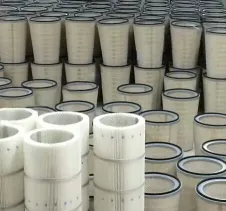 Tel:
+8615930870079
Tel:
+8615930870079
Nov . 10, 2024 12:44 Back to list
High-Performance Stainless Steel Filter Elements for Enhanced Filtration Solutions
Understanding Stainless Steel Filter Elements Their Importance and Applications
Stainless steel filter elements play a crucial role in various industries, serving as essential components in filtration systems. These filters are designed to remove impurities from liquids and gases, ensuring the quality and safety of the end products. Their unique properties, such as durability, corrosion resistance, and high temperature tolerance, make stainless steel an ideal material for filter elements in demanding environments.
The Composition and Properties of Stainless Steel
Stainless steel is an alloy made primarily of iron, chromium, and nickel. The chromium content is what gives stainless steel its resistance to corrosion, while nickel enhances its strength and toughness. There are different grades of stainless steel, each with its own properties suited for specific applications. For filtration purposes, grades such as 304 and 316 are commonly used due to their excellent corrosion resistance and ability to withstand high temperatures.
The structure of stainless steel filter elements can vary, including mesh, pleated, and sintered forms. Each design offers different filtration characteristics, allowing users to select the best option based on their specific needs. For instance, pleated stainless steel filters increase the surface area for filtration, improving flow rates and capturing more contaminants.
Applications of Stainless Steel Filter Elements
Stainless steel filter elements are utilized in a myriad of industries, including
1. Oil and Gas In the oil and gas sector, stainless steel filters are employed to separate solids and impurities from crude oil and natural gas. This ensures the efficiency of refining processes and protects equipment from damage caused by contaminants.
2. Food and Beverage The food and beverage industry requires strict adherence to hygiene and safety standards. Stainless steel filter elements are widely used in processes such as brewing, wine production, and water treatment, ensuring that the end products are free from harmful substances.
stainless steel filter element

3. Pharmaceuticals The pharmaceutical industry demands the highest level of cleanliness and sterility. Stainless steel filter elements help to remove particles, bacteria, and other impurities from raw materials and final products, protecting both the integrity of the medications and patient health.
4. Automotive In automotive applications, stainless steel filters can be found in fuel and oil filtration systems. They help to ensure proper engine performance and longevity by keeping contaminants out of critical components.
5. Chemical Processing Stainless steel filters are critical in chemical processing to separate solids from liquids, protect pumps and valves, and maintain product quality. Their durability allows them to withstand aggressive chemicals, making them a popular choice in this field.
Advantages of Using Stainless Steel Filter Elements
One of the primary advantages of stainless steel filter elements is their longevity. Unlike traditional filters made from paper or other materials, stainless steel filters can be cleaned and reused multiple times, resulting in cost savings over time. Additionally, they are less prone to degradation, ensuring consistent performance even in harsh conditions.
Another significant benefit is their ability to handle high temperatures and pressures. This is particularly important in industries where temperatures can fluctuate dramatically, as the integrity of the filter must be maintained to prevent failures that could lead to costly downtime or safety hazards.
Furthermore, stainless steel filter elements are environmentally friendly, as they reduce waste by being reusable and recyclable. This aligns with increasing global efforts to promote sustainability in industrial practices.
Conclusion
In conclusion, stainless steel filter elements are indispensable in various industries, providing reliable filtration solutions that enhance the quality and safety of products. Their robust properties, versatility, and economic advantages make them a preferred choice for many applications. As industries continue to evolve and demand higher standards for cleanliness and efficiency, the role of stainless steel filters will only grow in importance, proving essential for meeting both current and future challenges in filtration technology. Investing in high-quality stainless steel filter elements is not just a decision for today; it’s a commitment to sustainability and operational excellence for the future.
-
Types and Applications of Air Filtration CartridgesNewsJul.28,2025
-
The Role of Gas Turbine FiltersNewsJul.28,2025
-
Mastering Air Filter Cartridge UseNewsJul.28,2025
-
Advanced Turbine Filters for Modern Gas TurbinesNewsJul.28,2025
-
Cellulose Air Filter Cartridge Advantages in Dust FiltrationNewsJul.28,2025
-
Cellulose Filters for Air Particle ReductionNewsJul.28,2025

 Email:
Email:





